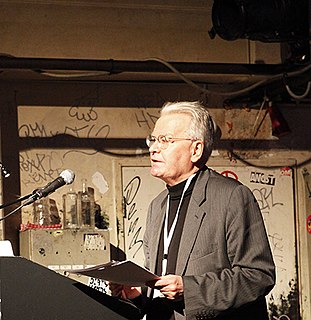A Quote by David Hockney
Modernism in a way, early modernism, for instance, in pictures, was turning against perspective and Europe. And all early modernism is actually from out of Europe, when you think of cubism is African, is looking at Africa, Matisse is looking at the arabesque, Oceania. Europe was the optical projection that had become photography, that had become film, that became television and it conquered the world.
Related Quotes
Libya faces along to the Mediterranean and had been effectively the cork in the bottle of Africa. So all problems, economic problems and civil war in Africa - previously people fleeing those problems didn't end up in Europe because Libya policed the Mediterranean. That was said explicitly at the time, back in early 2011 by Gaddafi: 'What do these Europeans think they're doing, trying to bomb and destroy the Libyan State? There's going to be floods of migrants out of Africa and jihadists into Europe', and this is exactly what happened.
Libya faces along to the Mediterranean and had been effectively the cork in the bottle of Africa. So all problems, economic problems and civil war in Africa - previously people fleeing those problems didn't end up in Europe because Libya policed the Mediterranean. That was said explicitly at the time, back in early 2011 by [Muammar] Gaddafi: 'What do these Europeans think they're doing, trying to bomb and destroy the Libyan State? There's going to be floods of migrants out of Africa and jihadists into Europe, and this is exactly what happened.
The moment in the account of Adam and Eve in the book of Genesis is when they realize they're naked and try and cover themselves with fig leaves. That seemed to me a perfect allegory of what happened in the 20th century with regard to literary modernism. Literary modernism grew out of a sense that, “Oh my god! I'm telling a story! Oh, that can't be the case, because I'm a clever person. I'm a literary person! What am I going to do to distinguish myself?...a lot of modernism does seem to come out of a fear of being thought an ordinary storyteller.
Modernism was a big thing for me, coming from a father who was very interested in art, music and culture - and almost always Italian art, music and culture. One good thing about Italians is that culture is part of everyday life. But Modernism is a movement of the past. The idea of a Modernist building as a sculpture set on a pedestal of grass is a part of Modernism that I'm not so crazy about.
I think that in this globalised world, the local is going to become more and more important - it is a paradox. You see it in Western Europe more and more. Eastern Europe is still coming out of the Soviet uniform cultural era, but this kind of separation and nationalism is very obvious now in Western Europe.






































